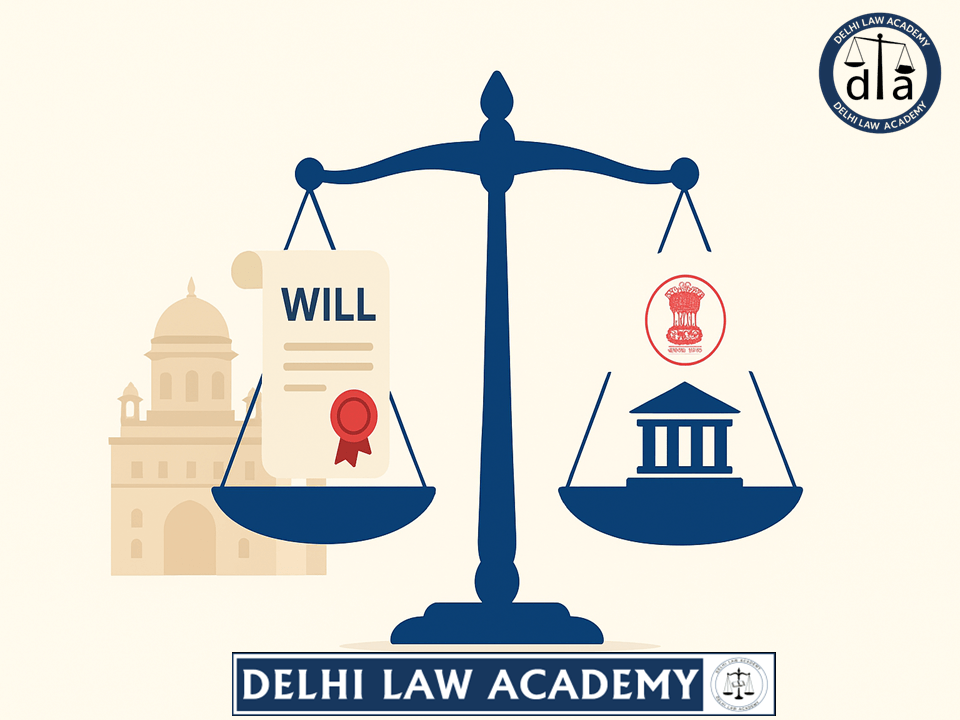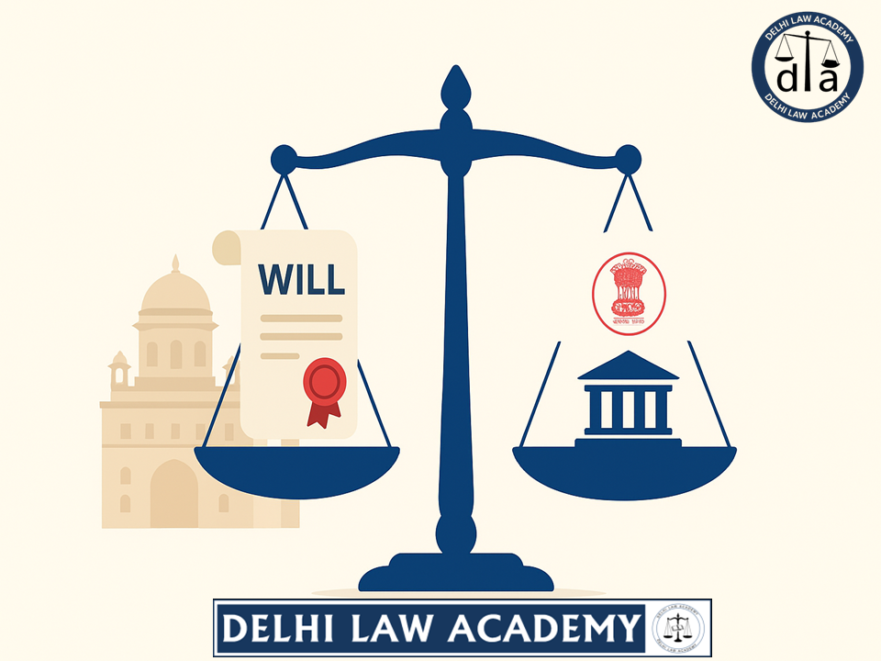
📜 Khetri Trust Case (2025): State vs Testamentary Freedom — Key Takeaways for Judiciary Aspirants
Word estimate: ~1,300–1,500 words • Updated analysis for RJS & judiciary preparation
🔎 Why this judgment matters
The Khetri Trust judgment sits at the intersection of succession law and public law. For judiciary aspirants, it is crucial because:
- It clarifies the scope of testamentary freedom under the Indian Succession framework.
- It addresses whether the State can claim proprietary rights over privately created trusts or wills on public-interest or historical grounds.
- It raises constitutional questions on state locus standi, property rights, and limits on executive/state power.
🧾 Factual background (concise)
The Khetri Trust — a private trust owning a portfolio of properties — executed a will/transfer that created its estate arrangement. The State of Rajasthan filed a claim challenging the will and asserting a right over certain properties (the contention involved state interest or historical claims). The Supreme Court reviewed the pleadings and the evidentiary record and concluded the state’s challenge lacked legal footing to displace a valid testamentary act.
⚖️ Legal issues adjudicated
- Validity of the Will: Whether the document satisfied statutory formalities (signature, witnesses, capacity, absence of undue influence).
- State’s Locus Standi: Whether the state had a legal right to contest the testamentary disposition in the absence of a recognized claim.
- Escheat / Public Claim: Whether the state’s claim, resting on historical or public interest grounds, could override a valid private testamentary disposition.
🔑 Court’s reasoning — key legal points
- Testamentary Freedom Preserved: The Court reaffirmed that a valid will — made with requisite capacity and free consent — must ordinarily stand unless convincingly shown to be vitiated by fraud, coercion, or incapacity.
- Strict Locus Requirements: The state cannot substitute its interest for that of a private litigant unless it demonstrates a direct, legally-recognized interest. Administrative or moral claims do not by themselves establish locus.
- Evidence Standard: The Bench required cogent evidence for allegations that could annul a will (e.g., undue influence). Mere suspicion or historical assertions are inadequate.
- Limits on Escheat/Resumption: The judgment limits broad state claims over private property — escheat or public repossession requires clear statutory basis and due process.
📚 Comparative points — what students should remember
Link this case to these syllabus topics:
- Indian Succession Act — essentials of a valid will (Sections on execution, witnesses, revocation).
- Transfer of Property Act — aspects touching transfers by testamentary instruments.
- Constitutional Law — property rights, due process, and state action (Art. 300A and administrative power).
- Evidence Law — proof standards for allegations like undue influence and fraud.
📝 Practical implications for practitioners & aspirants
- Lawyers advising trusts must ensure rigorous documentation and witness testimony to withstand challenges.
- Administrative bodies should rely on statutory authority before making property claims; policy objections do not equal legal title.
- For exam answers, use this case to illustrate how courts balance private rights vs. public interest — emphasize evidence and locus.
📌 Important excerpts (how to quote in answers)
When citing the judgment in Mains/Essay, prefer short quoted paraphrases such as:
- “A valid testamentary disposition cannot be displaced by speculative public claims; the challenger must establish clear legal standing and cogent evidence.”
- “State action to appropriate or challenge private property requires statutory authority and is subject to constitutional safeguards.”
🧠 Suggested short answer / model point for exams
Sample line for an answer (50–80 words):
In Khetri Trust (2025), the Supreme Court held that the State of Rajasthan lacked locus to challenge a valid will. The Court stressed testamentary freedom and insisted on strict evidence for claims of undue influence or fraud. The decision limits administrative overreach and reinforces that public policy objections cannot, without statutory support, override private testamentary rights.
⚖️ Critiques & possible future litigation points
- Will challenges on grounds such as substantive fairness (e.g., claims of public interest in heritage properties) may re-emerge with different evidence.
- Potential legislative responses: states may seek statutory routes to protect heritage assets — watch for policy changes.
- Debate: balancing cultural/historical claims against private testamentary autonomy — fertile ground for public law essays.
💬 Why this case is a must-study for RJS aspirants
This judgment is compact, fact-rich, and test-friendly — it ties directly to property law principles (often tested in RJS papers) and constitutional limits on state power. Use it as a case study for:
- Succession law notes — include a short summary and model facts-based question.
- Constitutional law essays — state vs private rights and due process.
- Evidence & procedure — how courts treat allegations vs. proof standards.
🔚 Conclusion
The Khetri Trust ruling reinforces an important legal axiom: private testamentary rights are protected unless convincingly rebutted by law and evidence. For aspirants, the case is a neat example of judicial restraint against administrative overreach and an essential addition to Property & Constitutional law notes.
❓ FAQs on the Khetri Trust Judgment
⚖️ What was the Khetri Trust case about?
The case involved the Rajasthan govt challenging the validity of the Khetri Trust’s will. The Supreme Court dismissed the state’s claim, upholding testamentary freedom.
📜 Why did the Supreme Court reject Rajasthan’s claim?
The Court held the state lacked locus standi since it had no direct legal interest in the property. Moral or historical arguments alone are insufficient.
🏛️ What principle of succession law was reinforced?
The judgment reaffirmed that a valid will, properly executed and witnessed, stands unless proven invalid by fraud, coercion, or incapacity.
📚 Why is this case important for judiciary aspirants?
It connects Property Law, Indian Succession Act, Evidence Law, and Constitutional principles (Art. 300A). Great for RJS and other state judiciary exams.
🔍 What does “locus standi” mean here?
It refers to the legal right to bring a case. Since Rajasthan govt had no legal stake, the SC ruled it lacked standing to challenge the will.
🧠 How to use this case in exam answers?
Mention it as an example where SC balanced private property rights against state overreach, emphasizing strict proof and legal standing requirements.
📚 Further Reading for Law Aspirants
Explore more useful resources from Delhi Law Academy to strengthen your preparation:
Contact us
📍 Delhi Law Academy – Jaipur Branch
6C, Tower 2, Coaching Hub, Pratap Nagar, Jaipur – 302033
📞 Phone:
+91 9911916552
+91 8447285606
✉️ Email:
contactus@delhilawacademy.com


Comments 1
Thank you for covering this case and appreciating its significance. I take this opportunity to bring greater clarity to the subject briefly. I am the Managing Trustee of Khetri Trust responsible for this litigation. The background of the case is very convoluted, so I will only touch upon the facts and leave it to you for the legal implications:
1. Raja Sardar Singh who was member of the Indian Constituent Assembly died in 1987 and in absence of any natural heir has registered his Will at Tees Hazari Courts forming a Testamentary Public Trust mandated to use his properties and wealth estimated at 3,000 crores in 1987, for promoting education in India through grants, scholarships for study in India and abroad.
2. Within a few months the Revenue Department passed an order to all the collectors to take the properties, almost 201 in their custody under the Rajasthan Escheats Act.
3. Even though there was no vacant property and all of them were either in possession of Khetri Trust or rented to generate income. The State Government was duly informed of the WILL in Tees Hazari Courts but the State refused to take cognisance of the WILL. While taking over the properties they kept no record of the movable assets, nor of the properties taken over by them as a result of the Escheats Action no one remained informed of what was the status of the 201 properties giving full license to illegal possession and heavy encroachments..
4. The State also took over the Heritage Hotel in Chandpole Jaipur, broke steel walls of the vaults and looted the entire property and then to hide the evidence they building was burnt. 30 staff members working in the Hotel disappeared overnight. Similarly every property in their custody was systematically looted and in 2023 the Collector Jaipur placed an Affidavit that they have no record of what was taken over in Escheats in 1987.
5. Two parallel cases were filed Probate in the Hon’ble Delhi High Court and Writ against the Escheats in the Hon’ble Rajasthan High Court. Five people entered the probate case claiming they were agnates by a common ancestor 10 generations separated from the Testator. In 1991 the Rajasthan State entered in the probate litigation as an objector on their claim that they had now become an interested party as they were in possession of the entire Estate under the Rajasthan Escheats Act.
6. Both cases finally were brought to the Supreme Court in appeal against orders of the High Court. The Escheats case is still pending and will be taken after the probate is decided. Though the Escheats is over with the order of probate, but the conduct of the State and the damages will be brought up in this case and it was due to the bad publicity which will follow, the State has tried its best to win the Probate.
7. The Solicitor General Mr. Tushar Shah appeared in the case and latter ASG Mr. Raju appeared in the case. The Bench was very clear and passed a landmark judgement:
a. State has no right to intervene in a private litigation,
b. the State can never be allowed to become a rival claimant in a probate case, which will create a very dangerous precedence where the State may start contesting any Testament that it finds is in its interest.
c. The order discussed extensively the succession of a Hindu and who are the only people that can engage in a probate litigation.
d. It also overturned a judgement of the privy counsel in which creditors could become objectors in the probate proceedings. It has been a general practice and caveat able interest required more clearity which has been given here
e. Lastly in their order against the Agnates the Bench has taken a serious view of perjury and ruled that an applicant cannot conceal facts from the Court for which they were not only prevented from presenting their case but also charged penalty of Rs. 1,00,000/- each.
If you write by email for further discussion or documents we will be happy to supply.